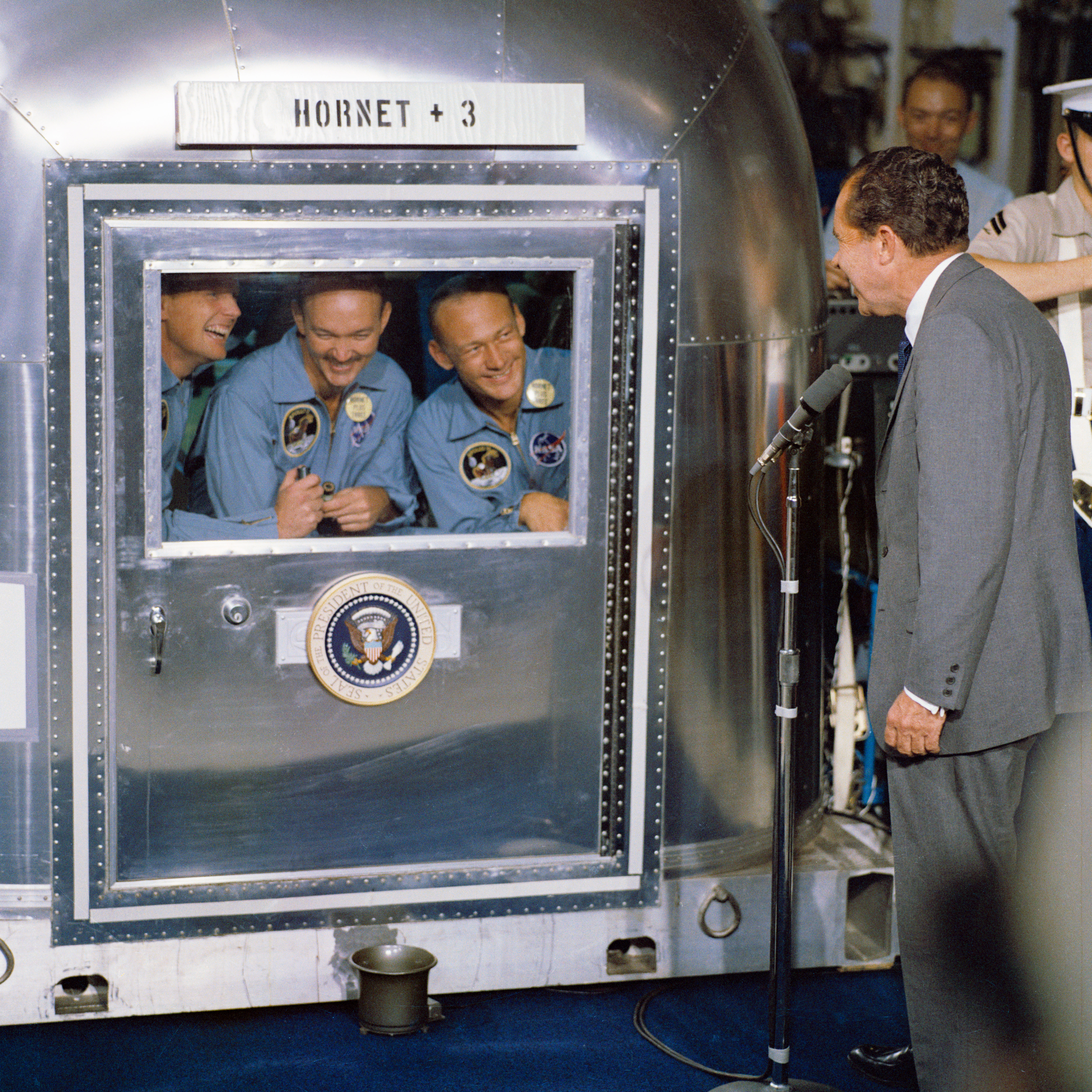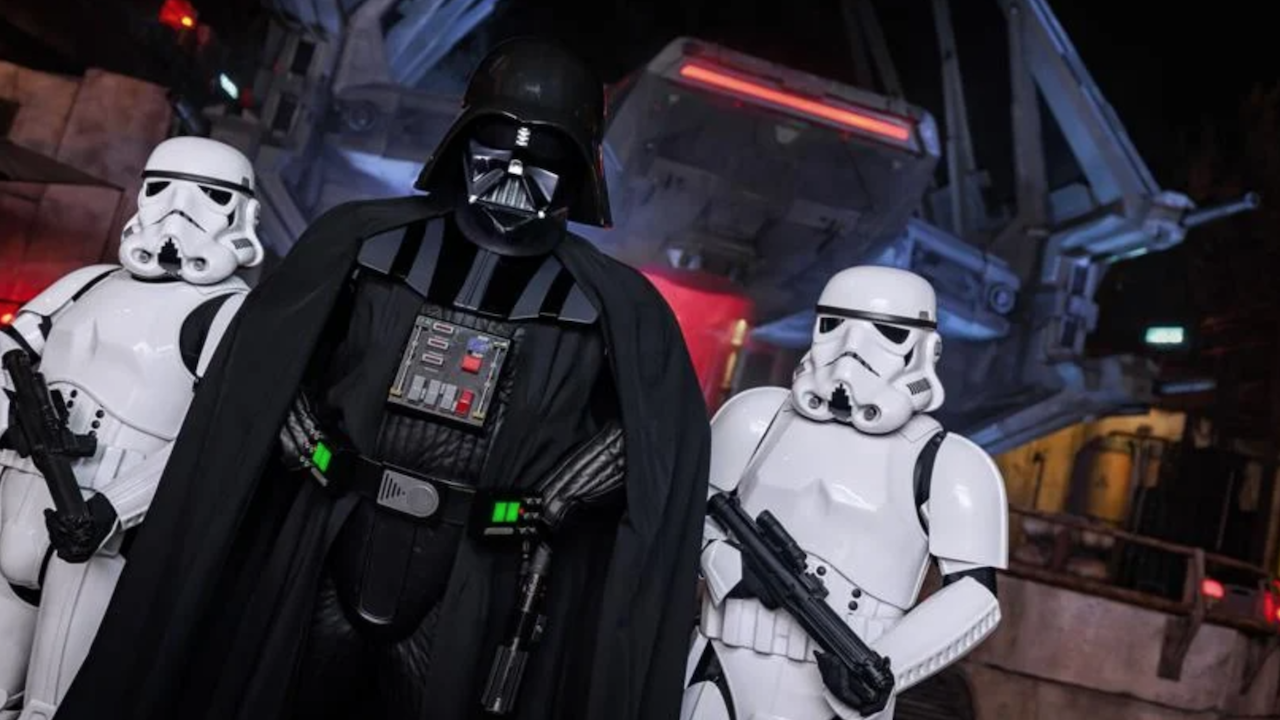Apollo 11 Moon Landing Had a Plan for Lunar Germs — But Video Clip Reveals a Big Flaw
Whoopsies!
When the Apollo 11 crewmembers splashed down in the Pacific Ocean on July 24, 1969, just days after two of them stepped onto the moon, NASA had procedures to contain any moon germs.
The astronauts were instructed to don isolation garments. They were scrubbed down and transported to a quarantine facility. But there was at least one issue with that plan, said the two astronauts from the mission still living today.
They shared their experiences in PBS' "Chasing the Moon," which premieres July 8 to 10 at 9 p.m. EDT — just days before the 50th anniversary of the moon landing July 20. The series covers the activities leading up to the Apollo 11 moon landing that took place 50 years ago. PBS provided this clip exclusively to Space.com.
Related: Apollo 11 at 50: A Complete Guide to the Historic Moon Landing Mission
Speaking over scenes of a recovery helicopter retrieving the spacecraft (also called the command module), crewmember Michael Collins recalled that "rooms full of scientists" didn't think there were germs, but NASA did want to take precautions.
During the moon landing, Collins himself stayed in the command module while his crewmates touched down in the lunar module. Nonetheless, Collins was "exposed" to any possible germs the moment his colleagues returned to the command module for the journey home.
"Look at it this way," he added. "Suppose there were germs on the moon. There are germs on the moon, we come back, the command module is full of lunar germs. The command module lands in the Pacific Ocean, and what do they do? Open the hatch. You got to open the hatch! All the damn germs come out!"
Breaking space news, the latest updates on rocket launches, skywatching events and more!
The sentiment was mirrored by Buzz Aldrin, one of the two astronauts who landed on the moon, along with Neil Armstrong (who died — of earthly natural causes, not lunar germs — in 2012 at age 82).
"You have to laugh a little bit," Aldrin said as archival footage showed the astronauts being disinfected inside a raft that floated beside the spacecraft. He recalled rescue personnel sponging him down, then throwing the used rag into the water beside them. "It takes all those germs to the bottom of the ocean," he said, then paused to laugh. "I wonder if they'd survive down there?"
The astronauts spent 21 days in quarantine, and some of those moments are captured in the documentary — including a party complete with cake. The astronauts and their support personnel celebrated on one side of a glass; their families celebrated on the other.
The astronauts emerged from quarantine with no issue. The crews Apollo 12 and 14 went through the same procedure upon their returns. NASA then dropped the requirement for isolation, and the last three moon crews — Apollos 15, 16 and 17 in 1971 and 1972 — didn't bother with quarantine whatsoever.
- Catch These Events Celebrating Apollo 11 Moon Landing's 50th Anniversary
- Reading Apollo 11: The Best New Books About the US Moon Landings
- Lego's Epic Apollo 11 Lunar Lander Set in Photos!
Follow Elizabeth Howell on Twitter @howellspace. Follow us on Twitter @Spacedotcom and on Facebook.

Elizabeth Howell (she/her), Ph.D., was a staff writer in the spaceflight channel between 2022 and 2024 specializing in Canadian space news. She was contributing writer for Space.com for 10 years from 2012 to 2024. Elizabeth's reporting includes multiple exclusives with the White House, leading world coverage about a lost-and-found space tomato on the International Space Station, witnessing five human spaceflight launches on two continents, flying parabolic, working inside a spacesuit, and participating in a simulated Mars mission. Her latest book, "Why Am I Taller?" (ECW Press, 2022) is co-written with astronaut Dave Williams.

